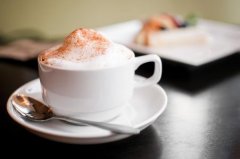Should you drink coffee or tea when you are tired?

When tired, many people are used to drinking a cup of tea or making a cup of instant coffee to refresh themselves, but do you know?
Your regular instant coffee contains little caffeine (caffeine is a xanthine alkaloid, a central nervous stimulant that temporarily repels drowsiness and restores energy).
Moreover, there is far less caffeine in coffee than in tea. If you don't believe it, take a look at the truth revealed to you by a reporter of Huashang Daily through two experiments.
Physical extraction
Green tea has the highest caffeine content. Instant coffee can hardly see caffeine.
Experiment time: December 11
Experimental venue: Xi'an Nutrition Society Life Laboratory
Experimental tools: green tea, instant coffee, pure coffee powder made from coffee beans (hereinafter referred to as coffee powder), quicklime, alcohol lamp, evaporation dish, filter paper, funnel
Experimental consultant: Wang Yongjian, vice president of Xi'an Nutrition Society and national first-class dietitian
Instructor: Yang Wenzi, Deputy Director of Food Safety Center of Xi'an Nutrition Association
Experimenter: dietitian Li Ya, Wang Min, Cao Zhulan, GE run of Xi'an Nutrition Society
Experimental methods: caffeine from green tea, instant coffee and coffee powder were extracted and compared.
The steps of the experiment:
The first step: weigh 5 grams of green tea, weigh 1.75 grams of quicklime, mix and grind into powder, put in evaporation dish, put evaporation dish on alcohol lamp, bake the mixed powder to light yellow, so that all moisture is removed.
The second step: after cooling, wipe off the powder attached to the edge of the evaporation dish with filter paper to avoid contaminating the product during sublimation.
Step 3: cover the evaporation dish with a piece of filter paper with many small holes (with a pin), then cover the glass funnel of the right size, and plug a little cotton in the neck of the funnel to reduce steam escape.
Step 4: heat and sublimate the asbestos net with a small fire of alcohol lamp, and the resulting steam will rise through the filter paper hole and condense on the filter paper hole or funnel wall after cooling. When a white hairy crystal is observed on the paper hole, stop heating and let it cool by itself. if necessary, the outer wall of the funnel can be cooled with a wet cloth, and when no vapor is observed in the funnel, the funnel and filter paper can be opened. Carefully observe the caffeine crystals on the filter paper.
Using the same method, caffeine crystals from coffee powder and instant coffee were extracted and compared.
Experimental results:
The caffeine crystals on the filter paper covered with green tea powder are very obvious and are densely covered with the whole filter paper. under the light, you can see obvious burrs, indicating that there are a lot of caffeine crystals.
A few crystals can be observed on the filter paper covered with coffee bean powder.
Caffeine crystals can hardly be seen on the filter paper covered with instant coffee, and the paper is still smooth and burr-free.
The results showed that green tea had the highest caffeine content, followed by coffee beans and instant coffee.
Quantitative detection
The caffeine content of green tea is still far ahead.
Because the method of extracting caffeine is a physical method, in order to ensure the accuracy of the experiment, Huashang Daily commissioned Xi'an Kangpai quality testing Co., Ltd., a professional testing agency qualified for independent testing by a third party, to quantitatively detect caffeine in another brand of green tea, coffee powder of the same brand and instant coffee.
Detection method:
National standard GB/T5009.139-2003 "determination of caffeine in beverages" second method "High performance liquid chromatography"
Detection steps:
Sample treatment-chromatographic conditions-drawing of standard curve-determination-result calculation.
Test results:
After determination, it was found that among the three products (green tea, pure coffee powder and instant coffee), the caffeine content was the highest in green tea, the second in pure coffee powder and the least in instant coffee.
The caffeine content of green tea is 26.88mg/g, the caffeine content of coffee powder is 8.49mg/g and the caffeine content of instant coffee is 3.00mg/g. The caffeine content of green tea is more than eight times that of instant coffee.
Result analysis
Instant coffee additives with poor liver and kidney function drink as little as possible
He Fei, director of the Food Department of Xi'an Kangpai quality Inspection Co., Ltd., said that according to relevant regulations, the maximum amount of caffeine used in cola carbonated drinks is 0.15g/kg (0.15mg/g), and there is no clear national standard for caffeine content in green tea and coffee.
Because of the cost, instant coffee is generally grown by Robusta, which is mainly produced in Vietnam, Hainan, Yunnan and Africa in China. In the meantime, broken beans and bad beans are often roasted and ground directly, and the lack of aroma is reconciled by various flavors and additives, which is also one of the reasons for the low caffeine content in instant coffee.
Experts from the Nutrition Society also said that from the composition table of instant coffee, the higher the content of ingredients, the higher the content of ingredients. Instant coffee is ranked first by plant fat powder, emulsifier, white granulated sugar, etc., followed by instant coffee and other food additives, so the content of instant coffee is very low, which is also the reason for less caffeine. Although these additives are harmless to the body, they are not beneficial. Most adults can metabolize normally, but people with poor liver and kidney metabolism, such as the elderly and children, are unable to metabolize, and long-term consumption may increase the burden on the liver and kidney. so it is recommended that these people drink as little as possible.
Coffee is a beverage made from roasted coffee beans, and its caffeine content varies depending on the variety, roasting method and baking time of the beans.
The basic components of green tea are caffeine (caffeine), polyphenols (catechin) and other components. Caffeine content is related to processing technology, brewing temperature, brewing time and other factors.
So this test data only represents the specific content of caffeine in the batch sample, and does not explain the comparison of caffeine content between all coffee powder and green tea.
Doubtful point analysis
Some people drink coffee more refreshing or individual differences.
Although the experimental results show that the caffeine content of green tea is much higher than that of coffee, many people still say that sometimes having a cup of coffee in the afternoon is very refreshing, even stronger than drinking tea.
In this regard, experts from Xi'an Nutrition Society said that this has a lot to do with individual differences, because individuals have different sensitivity to caffeine, and different quality coffee and tea have different levels of caffeine. Therefore, if you want to get a better pick-me-up effect, you need to choose better quality tea and coffee to drink.
In the choice of coffee, experts say try to choose coffee with high purity and few additives.
People who drink tea for a long time feel that it is not refreshing to drink tea, which may be due to nutrient deficiency.
Chinese people have a habit of drinking tea since ancient times, and many people drink tea as water in their daily life. Mr. Liu, a 60-year-old resident of Xi'an, is one of them. He has been substituting tea for water since he was in his 20s. Mr. Liu said that drinking tea had a refreshing effect when he was young, but now it doesn't have a refreshing effect.
Experts at the Nutrition Society say this may be due to the uneven quality of tea, or to the lack of nutrients associated with energy metabolism, and providing only functional substances (caffeine) is not necessarily refreshing.
Important Notice :
前街咖啡 FrontStreet Coffee has moved to new addredd:
FrontStreet Coffee Address: 315,Donghua East Road,GuangZhou
Tel:020 38364473
- Prev

Medium and high concentration coffee is beneficial to obese people.
American scientists have found that coffee can reduce the adverse effects of obesity on mice. High levels of chlorogenic acid in coffee may be beneficial to obese people, reducing insulin resistance and limiting fat accumulation in the liver. It is reported that researchers from the Department of Pharmacy at the University of Georgia in the United States conducted experiments on mice to evaluate the role of chlorogenic acid in preventing and treating insulin resistance and fat accumulation. they
- Next

Drinking coffee aggravates menopausal hot flashes?
Hot flashes and night sweats at night affect the lives of about 2% of menopausal women. Drinking caffeinated drinks such as coffee can aggravate menopausal hot flashes and night sweats, a new study has found. Caffeine (stimulants in drinks such as coffee, cola and tea) can boost mood, memory and attention, but in postmenopausal women, caffeine can aggravate hot flashes and night sweats at night.
Related
- Beginners will see the "Coffee pull flower" guide!
- What is the difference between ice blog purified milk and ordinary milk coffee?
- Why is the Philippines the largest producer of crops in Liberia?
- For coffee extraction, should the fine powder be retained?
- How does extracted espresso fill pressed powder? How much strength does it take to press the powder?
- How to make jasmine cold extract coffee? Is the jasmine + latte good?
- Will this little toy really make the coffee taste better? How does Lily Drip affect coffee extraction?
- Will the action of slapping the filter cup also affect coffee extraction?
- What's the difference between powder-to-water ratio and powder-to-liquid ratio?
- What is the Ethiopian local species? What does it have to do with Heirloom native species?

